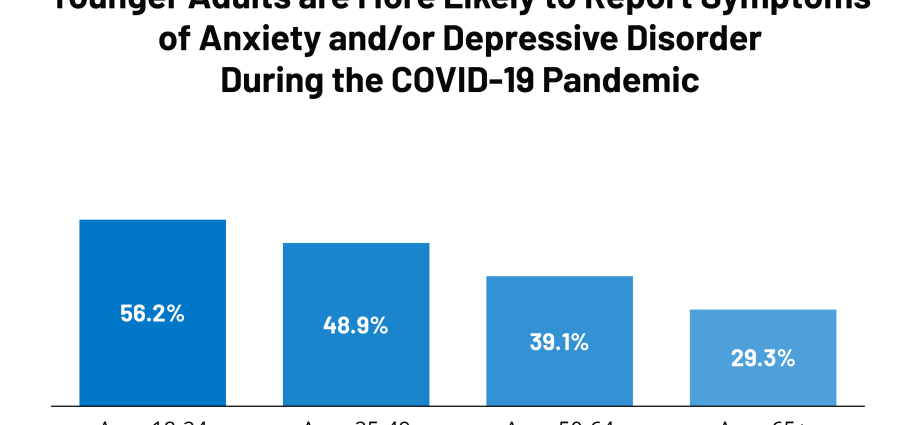Mataupu
E tusa ai ma lana misiona, e faia e le Fa'atonu Fa'atonu a MedTvoiLokony taumafaiga uma e tu'uina atu fa'amaumauga fa'afoma'i fa'atuatuaina e lagolagoina e le poto fa'asaienisi lata mai. O le fuʻa faaopoopo "Checked Content" e faʻaalia ai o le tusiga na toe iloiloina pe tusia saʻo e se fomaʻi. O lenei faʻamaoniga e lua-laasaga: o se tusitala faʻafomaʻi ma se fomaʻi e faʻatagaina i matou e tuʻuina atu mea sili ona lelei e tusa ai ma le poto faʻafomaʻi o loʻo iai nei.
O la matou tautinoga i lenei vaega ua talisapaia, faatasi ai ma isi, e le Association of Journalists for Health, lea na tuʻuina atu i le Faʻatonu Faʻatonu a MedTvoiLokony ma le faʻailoga mamalu o le Aʻoaʻoga Sili.
Scientists are still discovering the long-term effects of COVID-19. More and more information concerns the work of the brain and nervous system. According to psychiatrists, people who have contracted COVID-19 are more likely to develop mental disorders. These are disturbing reports.
- More and more studies show that COVID-19 affects the work of the brain and may increase the risk of mental disorders in people who have contracted the infection
- 1 in 5 people after contracting COVID-19 have developed disorders such as anxiety, depression or insomnia
- Fa'amatalaga fa'afouina i luga ole itulau autu o TvoiLokony
Mental disorders in patients after COVID-19
The SARS-CoV-2 coronavirus not only affects the respiratory tract, but also affects other organs in our body. More and more studies show that it can affect the work of our brain. Scientists studied people who contracted COVID-19 and found that some of them had mental health problems. The most frequently mentioned were anxiety, depression and insomnia. The researchers also found that these patients were also more likely to develop dementia.
Tagai foi i le: COVID-19 Fa'atele le Fai'ai Matua?
“People are concerned that people who have had COVID-19 will be at greater risk of mental health problems, and our findings … show that it is likely,” said Paul Harrison, professor of psychiatry at the University of Oxford.
According to the psychiatrist, health services must be ready to provide care to COVID-19 patients who develop mental health problems, especially as the results of the study may be underestimated.
O e a'afia i le coronavirus po'o se tasi e latalata ia te oe ua maua ile COVID-19? Pe atonu o lo'o e faigaluega ile 'au'aunaga fa'alesoifua maloloina? E te mana'o e fa'asoa lau tala pe lipotia ni fa'aletonu na e va'aia pe a'afia ai? Tusi mai ia i matou i: [Imeli puipuia]. Matou te fa'amaonia le le ta'ua!
Anxiety, depression and insomnia after developing COVID-19
Scientists analyzed the health cards of 69 million people in the United States, including more than 62. with confirmed COVID-19. Within three months of testing positive for COVID-19, 1 in 5 survivors are first diagnosed with disorders such as anxiety, depression or insomnia. The study was published in the journal “The Lancet Psychiatry”.
Interestingly, researchers also found that people diagnosed with mental disorders are 65 percent. more likely to be infected with SARS-CoV-2 coronavirus than people without the disorder.
Mental health experts who were not involved in the study said these findings are yet another confirmation that COVID-19 affects the work of the brain and may contribute to an increased risk of a number of mental disorders.
“This is likely due to a combination of the psychological stressors associated with this particular pandemic and the physical effects of the disease,” said Michael Bloomfield, consultant psychiatrist at University College London.
Simon Wessely, professor of psychiatry at King’s College London, said the finding that people with mental health disorders are more susceptible to contracting SARS-CoV-2 coronavirus supports what previous research has shown.
«COVID-19 affects the central nervous system, so it can exacerbate further disorders. Research confirms that this is not all, and that the risk is increased by previous poor health, »added Wessely.
E fautuaina e le komiti faatonu:
- Ua fa'ailoa mai se fa'ailoga fou fou o le COVID-19. Atonu e faalavelave
- Sa suʻesuʻeina e saienitisi mama o i latou na maliliu mai le COVID-19. E pei ona aliali mai?
- E mafai ona a'afia ai le ogaoga ole COVID-19 ole ese'esega laiti laiti
O mea o loʻo i totonu o le upega tafaʻilagi medTvoiLokony ua faʻamoemoe e faʻaleleia, ae le o le suia, le fesoʻotaʻiga i le va o le Tagata Faʻaoga Upega Tafaʻilagi ma a latou fomaʻi. O le upega tafa'ilagi ua fa'amoemoe mo na'o fa'amatalaga fa'aa'oa'oga. Aʻo leʻi mulimuli i le poto faʻapitoa, aemaise fautuaga faʻafomaʻi, o loʻo i luga o la matou Upega Tafaʻilagi, e tatau ona e faʻafesoʻotaʻi se fomaʻi. E leai se a'afiaga a le Pule e mafua mai i le fa'aogaina o fa'amatalaga o lo'o i luga ole Upega Tafa'ilagi. E te mana'omia se fa'atalanoaga fa'afoma'i po'o se fa'amatalaga fa'akomepiuta? Alu i le halodoctor.pl, e te maua ai le fesoasoani i luga ole laiga – vave, saogalemu ma e aunoa ma le tuua o lou fale.










